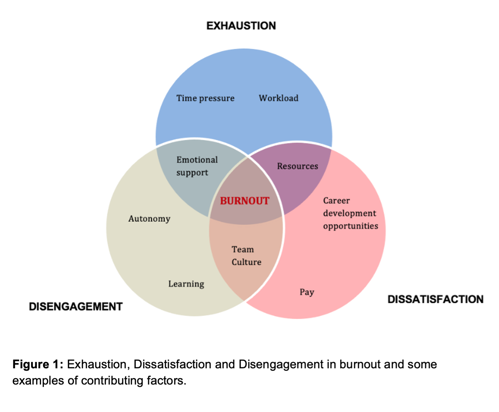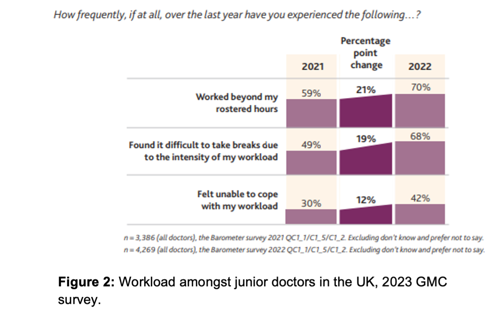Practice Development, Global Ophthalmology, Young Ophthalmologists
Know Thy Enemy

Harry Rosen
Published: Tuesday, October 1, 2024
“Know thy enemy,” said Sun Tzu, military strategist and philosopher. Trainees accept that burnout is an ugly, embedded part of modern training. Meanwhile, senior surgeons are often confused, even exasperated in trying to understand it. Most of us struggle to even define burnout. It is imperative we recognise and understand burnout, to make changes to prevent it.
Burnout is the damaging trajectory that occurs when exhausted, dissatisfied professionals in any field become sequentially disengaged, often to a point of no return. Figure 1 illustrates some of the key interactions between exhaustion, dissatisfaction, and disengagement and the multitude of factors that contribute.

The scale of the problem
Burnout is an acutely worsening problem. In the case of the UK, ophthalmology has the fastest growing rate of ‘high-risk’ burnout compared to any other specialty. 22% of ophthalmology trainees were at high risk of burnout in 2023, a 50% increase from 2022.1 Taken from the 2023 GMC survey of 70,000 responses, 93% of these stated they are likely to make a career change. Burnout and dissatisfaction were offered as the two main modifiable justifications for leaving.
Burnout is not a partisan nor polarising problem between trainees and experienced trainers. Rates of ‘high-risk’ burnout among senior trainers has also seen a significant rise over the last 3 years. Similar trends among ophthalmologists exist worldwide.2
Why are we burnt out and why now?
The rise in burnout is multifactorial. Figures 2 and 3 illustrate the recent rise in workload and dramatic drop in satisfaction among doctors in the UK. Among ophthalmologists alone, 53% of trainees say they work overtime daily or weekly (42% average among other specialties), 42% feel short of sleep at work, and 40% find the work emotionally exhausting.1
Patients are living longer, and resources available per patient are decreasing. Due to the geriatric, ‘high-flow’ nature of our patient footfall, ophthalmology is particularly sensitive to these demographic changes. Traditionally, this workload was offset by forgiving on-call and inpatient commitments. These silver linings are being overshadowed by increasing workload and a failing primary care sector.
As a competitive, vocational career, ophthalmologists have other unique challenges. Like myself, many trainees move hundreds of miles to take up training posts, leaving behind friends, families, and support networks.


What should be done?
We need specific, material, affordable changes we can implement locally. Each of the following changes could increase the retention of doctors. This would exponentially ease the burden of burnout, as quickly as the problem grows.
1. Mentoring
David Lockington recently wrote a powerful piece on burnout for The Ophthalmologist, hailing the protective benefits of time management, diversity, resilience, and autonomy. Mentors such as these could guide trainees to develop these skills in both life and work. As he writes, Maslow’s hierarchy of needs states that ‘self-actualisation’ is the very peak of personal wellness. A trusted mentor is the best way to strive towards this, helping to set goals and guide trainees towards achieving them.
2. The team
One of the greatest recent losses among hospital workplaces is a sense of culture, camaraderie, and loyalty. Despite the noble intention of standardising patient care, medical practice has edged towards centralised, impersonal bureaucracy. Simple solutions could include regular social events, comprehensive inductions, longer (at least 12-month) rotational periods, and consistent theatre/clinic team members. These interventions not only improve patient care but also make work life enjoyable, efficient, and productive.
3. Prioritising teaching and learning
Curiosity and learning are often the first things we sacrifice in a busy operating list or clinic. These are the aspects that bring character and colour to the work we do. Likewise, the faster a trainee can practice independently, the lower the workload will be for the team. Maintaining a focus on continuous career learning both reinvigorates clinical practice and reduces our workload by developing competent trainees.
4. Resources
Any fresh-faced management consultant can tell you that appropriately resourced and happy staff will be more productive. Rest spaces (which aren’t used as backup filing storage), parking, coffee/food/drink access, access to outdoor space, appropriate changing facilities, childcare, flexible rota patterns, etc. are all low-cost interventions to protect staff well-being. Perhaps more importantly, they make staff feel valued by the organisation and motivated to do their best for patients.
Conclusion
There is no doubt that burnout is a growing and complex problem. Here, I have outlined the true nature of burnout, its root causes and some simple practical solutions to build resilient trainees for the future. As many have done already, all that remains is for leaders to take action.
Dr Rosen submitted the winning essay for the 2024 John Henahan Writing Prize competition answering this prompt: ‘Burnout is a chronic issue in ophthalmology, leading a growing number to abandon the field early in their careers. What should be done to reduce unnecessary stress in training and practice, allowing for a successful long-term career?’.
Harry Rosen is a Year 1 Specialty Trainee at Portsmouth Hospitals University NHS Trust in the UK. harrysrosen@gmail.com
1. GMC’s 2023 annual training survey shows progression improving for ophthalmologists in training, alongside concerns over burnout and access to independent sector | The Royal College of Ophthalmologists. https://www.rcophth. ac.uk/news-views/gmcs-2023-annual-training-survey-shows-progression-improving-for-ophthalmologists-in-training-alongside-concerns-over-burnout-and-access-to-independent-sector/.
2. Cheung R, Yu B, Iordanous Y, Malvankar-Mehta MS. “The Prevalence of Occupational Burnout Among Ophthalmologists: A Systematic Review and Meta-Analysis,” Psychol Rep, 124, 2139–2154 (2021).